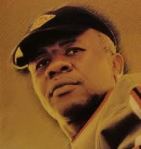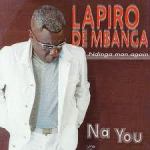
The current news of Lapiro de Mbanga’s death really took me by surprise. It really saddened me. In the past few months, Cameroon has lost some of its most valiant fighters: Abel Eyinga, Charles Ateba Eyene, and now Lapiro de Mbanga. Lambo Sandjo Pierre Roger, also known as Lapiro de Mbanga, was a freedom fighter for those without voice; he was an outspoken critic of the government of Paul Biya, and made himself the spoken voice of thousands of Cameroonian who could not speak and whose rights were bent. Ndinga Man, or the guitar man, used music to say what others were afraid to say.

Born in the village of Mbanga, just north west of Douala, Pierre Roger Lambo Sandjo started his career under the name of Pastor Sandjo Lapiro in the late 70s when his disks were made in Nigeria. He later adopted the stage name of LAPIRO, part of his name LAmbo PIerre ROger, of Mbanga his birthplace. In 1986, he collaborated with his fellow countryman Toto Guillaume (from Kassav), and came out with Pas argent No Love, and then No Make Erreur. He chose to sing in Pidgin, mixed in with some English, French, and Douala, for all his countrymen to understand, and to articulate all the daily injustices he witnessed. The Jamaican Jimmy Cliff praised Lapiro’s qualities on the album’s back cover, and hoped to see him go international. Lapiro’s strong stance, without any deference against the authorities, gained him an immense popularity just like the Nigerian artist Fela.

His songs echoed the struggle for democracy in Cameroon. For the past 25 years, Lapiro’s songs – No Make Erreur, Pas argent no love, Kop Nie, Mimba We, Na You, Ndinga Man contre-attaque : na wou go pay ? – often flirted with censorship and provoked the ire of officials. Like he said of the president who did not want to leave power, Day di go mandat di bole… But it was his 2008 composition Constitution Constipée which really brought Lapiro face to face with the country’s repressive justice system, and landed him three years in the country’s jails. This protest song denounced the amendment of the constitutional clause, which limited presidential mandates to two non-renewable seven year terms. As usual his lyrics mixed in humour and anger in calling for Biya to step down, since the pacho (old man) is daya (tired) and has outlived his usefulness. The song was banned from airwaves; but since “impossible n’est pas camerounais” it was leaked out, and became the anthem for the youths and workers’ protests against the steep rise of the cost of living in the February 2008 riots. Lapiro was arrested and thrown to jail for inciting violence and arson. He spent the next three years ‘rotting’ in jails in Douala as a political prisoner in the worst conditions ever: sleeping on the floor in the rain, sharing the cell with 50 or more others, eating one meal a day, not having access to proper health care, etc. It is believed that he was only granted his freedom in 2011 because he was on the verge of death. In 2012, he sought and was granted political asylum in the USA. He arrived with his family in September of 2012. Lapiro joined his ancestors last night…

All said and done, Lapiro was really the idol of the downtrodden and forgotten people, the sauvetteurs and the bayam selams; he was the voice of the voiceless. Many believe the opposition leader John Fru Ndi would have never had the “aura” he had in the 90s without Lapiro. Truly Lapiro sang for the people, talked about the youth’s shattered dreams, the division, the tribalism, the corruption, the decadence, and the ills of the country. Cameroon has once again lost one of his great sons. This makes me want to ask Bob Marley’s question: How long shall they kill our prophets while we stand aside and look? It really hurts, but we should remember Lapiro, our ambassador, as the outspoken critics, the voice of those without voice, and the “complice of the contre man” as he said himself. Ndinga Man, rest in peace! Enjoy No Make Erreur!!!


Pingback: Who/what did we say goodbye to in Africa in 2014? | African Heritage